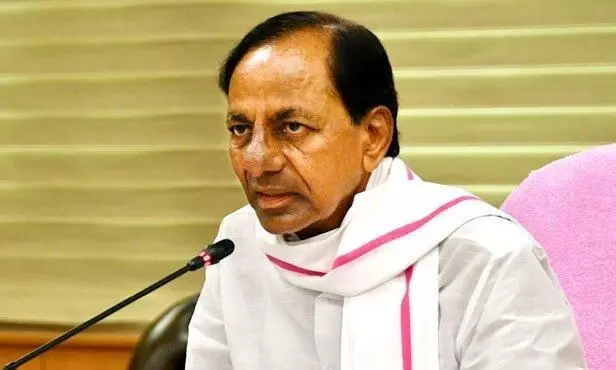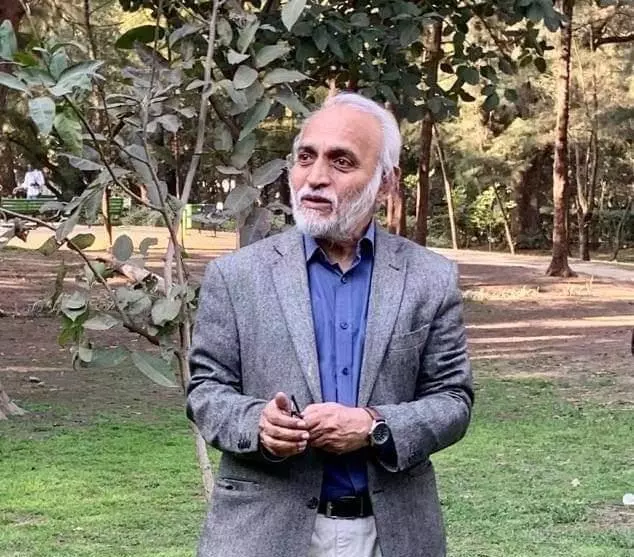Does India need a new national party? Yes, it does; KCR must do it
KCR has the advantage of starting afresh. And he should give it a serious thought and strong push

KCR
Is there a need for a new national party India? This is not an idle question, meant for salon conversations. It is an important one however unrealistic the prospects of a new national party emerging right now is. India is a large country and it can accommodate half-a-dozen and more national parties. Of course, they need to be truly national parties in the sense that that they should have a footprint across the country.
For example, All India Majlis Ittehad-ul-Muslimeen (AIMIM) or the All India Anna Dravida Munntera Kazhagam (AIADMK) cannot be deemed national parties despite the presence of "All India" in the name of their parties. Mr Asaduddin Owaisi, president, AIMIM, has tried to spread his party's footprint in Bihar, Uttar Pradesh and Maharashtra, but he is focused on the issues of the Muslim community. It is a legitimate concern, but that does not make AIMIM a national party. Nor does Mr Sharad Pawar's Nationalist Congress Party (NCP) become a national party because of its negligible presence in Bihar, Manipur, Meghalaya.
That leaves us with three national parties, the 135+ Indian National Congress (INC), the 42-yeard-old Bharatiya Janata Party (BJP), and the two Communist parties. There will be objections to describing the Communist parties as national. The reason is that despite their absence in large parts of India except in West Bengal, where they have melted post-Mamata Banerjee's success with her All India Trinamool Congress (AITMC), Kerala, and in Tripura where it failed to hold out against the BJP, a tenuous presence in parts of Bihar, Kashmir, Punjab, Tamil Nadu, Andhra Pradesh, these two parties remain national because of their broad national outlook. The NCP fails the test because it is not able to get out of its stronghold of Maharashtra.
Asking the people of the country to choose between BJP and Congress is forcing a choice upon them even if they do not like either of them. This is the dominance of a duopoly, and it can be said that Congress and the BJP have not indulged in political cartelization as such, and that the dominance of the two parties as such is happenstance.
The BJP and the Congress have reduced the smaller regional parties into a state of political feudatories even as they became undeclared overlords. The Communists are in no position to offer a third choice to the country.
It is in this context that the intense speculation about Telangana Chief Minister and Telangana Rashtra Samithi president K.Chandrasekhar Rao launching a national party gains interest and importance. It is possible that he might give up the idea as did N.T. Rama Rao, the founder of Telugu Desam and who toyed with the idea of launching Bharata Desam back in the 1980s. Or maybe, he doesn't. The idea of launching a national party from a place south of the Vindhyas may seem something that is doomed to fail because no one in north India is likely to accept a party that starts out from the south. It goes against the grain of India's political history.
But if it is a good national party with clear ideas and a clear strategy, it should be acceptable even as the success of IT companies from the south like Infosys or Wipro is acceptable at a national level in terms of employment.
So, Mr Rao's idea of launching a national party is sound, innovative, and to use the cliché, reflects out-of-the-box thinking. What India needs is a national party with new ideas and a new outlook.
Both Congress and the BJP are heirs of dead history. Their roots are in the past. They do not stand in the present and they do not look to the future. Even if Mr Rao does not launch his national venture, it does not matter. The idea should remain alive, and there is need to consider the option by the thinking classes across the states and the voters in the country should get a chance of considering the option.
Even if Mr Rao launches the party and it fails to take off, which is a possibility, and it might be due to the political inertia in the country and not because it is an unrealistic idea. If the venture fails to take off, and it could, given the political inertia in the country, and it would be no shame that it remains a failed effort. It remains a bold idea and a good idea.
Many might want to recall the experience of the Indian socialist parties of the 1950s and 1960s, and that of the Swatantra Party, founded by C.Rajagopalachari, which were national parties. They failed due to internal and external reasons. It is time that India had the option of a new national party. There is speculation that Aam Aadmi Party (AAP) could emerge as a national party. But it does not seem to live up the expectation because of its narrow focus on removing corruption. It is like Prime Minister Narendra Modi's focus on building toilets. The nation needs to get rid of corruption and it needs toilets. But it needs many more things. And neither Mr Modi nor Mr Arvind Kejriwal, the brain behind AAP, seem capable of thinking of a broader agenda for a vast country like India.
Mr Rao has an opportunity to build a national party. He has the resources and understanding as well. And he has been able to reach out to leaders and people in different corners of the country. He has shown the right temperament for national consultations. His ability to speak the Deccani Urdu pidgin helps him to talk to people in north India. Former prime minister P.V.Narasimha Rao might have been a polyglot, who spoke Hindi, Urdu and Marathi with ease but he never travelled to consult with other leaders and he was heading a Congress with historical baggage.
Mr Chandrasekhara Rao has the advantage of starting afresh. And he should give it a serious thought and strong push.



